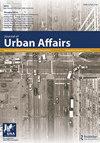Struggles over city-making: The community program for neighborhood improvement in Mexico City
IF 1.9
3区 经济学
Q2 URBAN STUDIES
引用次数: 0
Abstract
This article traces the trajectory of the making and unmaking of the Community Program for Neighborhood Improvement (PCMB), a participatory program for upgrading social infrastructure and public spaces in marginalized neighborhoods of Mexico City. The PCMB is an example of the range of upgrading programs supported by progressive local governments throughout Latin America over the past 20 years. Proposed by the city’s urban popular movement as part of their longstanding commitment to “city-making from below,” the PCMB was launched in 2007. At its inception, the PCMB was designed to co-produce neighborhood improvements through providing state support for resident-led planning and governance of community spaces. In 2019, the Mexico City government unexpectedly dismantled key participatory elements of the PCMB and folded it into other city priorities, including safe pathways and its surveillance-oriented security strategy. Based on fieldwork involving site visits and interviews with residents, community leaders, and city officials, we narrate the transformation of the PCMB (2007–2021) as state-society struggles over city-making. We argue that these tensions pivot around different spatial and political logics pertaining to territory, agency, and citizenship in city-making. The analysis also brings into focus how local governments attempt to diffuse, co-opt, or contain more radical city-making initiatives.城市建设的斗争:墨西哥城社区改善计划
本文追溯了“社区改善计划”(PCMB)的制定和取消的轨迹,PCMB是墨西哥城边缘化社区的社会基础设施和公共空间升级的参与性计划。PCMB是过去20年来拉丁美洲进步地方政府支持的一系列升级项目的一个例子。作为“自下而上的城市建设”的长期承诺的一部分,PCMB于2007年启动。在其成立之初,PCMB旨在通过为居民主导的社区空间规划和治理提供国家支持,共同促进社区改善。2019年,墨西哥城政府出人意料地取消了PCMB的关键参与要素,并将其纳入其他城市优先事项,包括安全道路和以监控为导向的安全战略。基于实地考察和对居民、社区领袖和城市官员的访谈,我们将PCMB的转型(2007-2021)描述为国家-社会在城市建设中的斗争。我们认为,这些紧张关系围绕着与城市建设中的领土、机构和公民身份有关的不同空间和政治逻辑。该分析还关注了地方政府如何试图分散、拉拢或遏制更激进的城市建设倡议。
本文章由计算机程序翻译,如有差异,请以英文原文为准。
求助全文
约1分钟内获得全文
求助全文
来源期刊

Journal of Urban Affairs
URBAN STUDIES-
CiteScore
5.40
自引率
4.80%
发文量
156
期刊介绍:
Focusing on urban research and policy analysis, the Journal of Urban Affairs is among the most widely cited journals in the field. Published for the Urban Affairs Association, the journal offers multidisciplinary perspectives and explores issues of relevance to both scholars and practitioners, including: - Theoretical, conceptual, or methodological approaches to metropolitan and community problems - Empirical research that advances the understanding of society - Strategies for social change in the urban milieu - Innovative urban policies and programs - Issues of current interest to those who work in the field and those who study the urban and regional environment
 求助内容:
求助内容: 应助结果提醒方式:
应助结果提醒方式:


